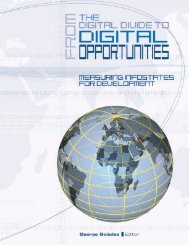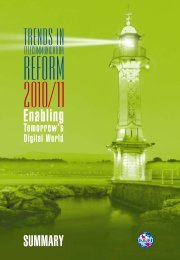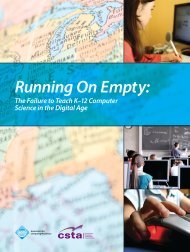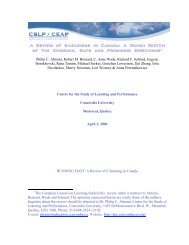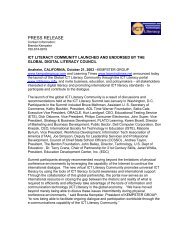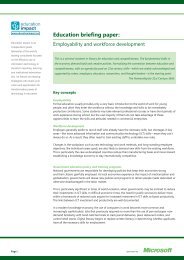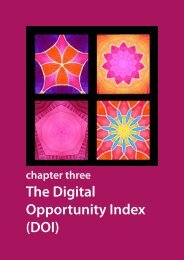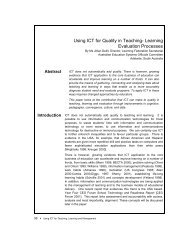147 pages pdf - ICT Digital Literacy
147 pages pdf - ICT Digital Literacy
147 pages pdf - ICT Digital Literacy
Create successful ePaper yourself
Turn your PDF publications into a flip-book with our unique Google optimized e-Paper software.
Pedagogy & Webagogy -- Ready, Set … TRAIN and FACILITATE!<br />
#609: Be Professional<br />
At the outset, agree to a time frame for responding to student questions / problems and stick to<br />
it. To keep students waiting will frustrate them and probably hinder their progress.<br />
Anonymous<br />
#610: Think Outside Your Group<br />
Group work doesn't always have to be with just the online participants. Participants can be<br />
assigned group work that requires them to find or form a group back on the job or out in the<br />
community. This allows for meaningful face-to-face interaction which then can be rolled back up<br />
into the e-Group. This is also very valuable because the utilization of people outside of the<br />
participant population broadens and deepens the insights and inputs.<br />
Thomas Campbell<br />
Thomas Campbell & Co., Inc.<br />
#611: Time It To Succeed<br />
Without a facilitator and integrating discussion groups into something that is timely, learners will<br />
die a slow death. There needs to be urgency and a clear person leading the discussion.<br />
Linda English<br />
Save The Children<br />
#612: No Surprises Are A Good Thing<br />
Create a "formal" agreement between the student and the instructor regarding the student's<br />
study plan. Help students schedule what they must do and how they must study. Explain to the<br />
student ahead ot time what they are going to go through, what they are supposed to do, what<br />
problems they might have.<br />
Eduardo Ramos<br />
Instituto Infnet<br />
#613: The Post From Hell<br />
Encourage the facilitator or instructor in an online course to outline the limitations of "posting"<br />
within the respective Courseware Management System being used. Many times it is not obvious<br />
at all that certain documents or file types cannot be converted or accomodated by the system.<br />
Rose M. Kimberley<br />
Soldier Support Institute<br />
#614: Long Live Gumby (The Eraser)!<br />
Expect mistakes and be ready to demonstrate your flexibility as a facilitator/trainer when they arise.<br />
Betsie Reynolds<br />
Ingram Micro<br />
#615: BookSmart<br />
Do you need articles and e-books for your e-Learning course? Check with your library - they may already have<br />
access to legal electronic copies in their database subscriptions. Assigning projects or essays? Check with your<br />
librarians - they may already have useful web tools that help learners with bibliographies and footnotes. Many<br />
libraries also have an Ask-A-Librarian button or real-time web-based or email virtual reference services.<br />
Consider using it as appropriate points in your courses. Not sure about how to get the rights to that article,<br />
graphic or book for your course? Librarians are often experts in copyright and licensing these objects legally.<br />
There are many opportunities to integrate libraries, librarians and their services into e-Learning so use your<br />
library as a resource - it has good stuff!<br />
Stephen Abram<br />
Sirsi<br />
701 e-Learning Tips by The MASIE Center www.masie.com 121





